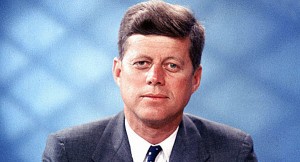WND
Sept. 19, 2013
Was John F. Kennedy assassinated as the first presidential victim of the emerging “New World Order” championed by former CIA directors Allen Dulles and George H. W. Bush?
Armed with recently declassified documents, New York Times bestselling author Jerome Corsi tackles that question in “Who Really Killed Kennedy” as the 50th anniversary of the assassination approaches.
Corsi points out Kennedy had refused to authorize the Navy to launch a military strike from an aircraft carrier to save the faltering U.S.-backed invasion of Cuba known as the Bay of Pigs attack.
Kennedy also refused to authorize the use of U.S. military force in Laos and, just before he was assassinated, he had decided to pull out of Vietnam.
Hot war in Vietnam
On Sept. 2, 1963, Labor Day, at Hyannis Port, Mass., JFK had a relaxed interview outdoors with CBS anchorman Walter Cronkite, who that sunny day was inaugurating a new television news program.
About midway into the interview, Cronkite asked about Vietnam: “Mr. President, the only hot war we’ve got running at the moment is of course the one in Vietnam, and we have our difficulties there, quite obviously.”
Kennedy answered directly, careful to set the stage for explaining why a military withdrawal from Vietnam was beginning to make sense to him.
“I don’t think that unless a greater effort is made by the government [of South Vietnam] to win popular support that the war can be won out there,” Kennedy explained.
“In the final analysis, it is their war. They are the ones who have to win it or lose it. We can’t help them, we can give them equipment, we can send our men out there as advisers, but they have to win it, the people of Vietnam, against the communists.”
In the interview, notes Corsi, Kennedy distanced himself from saying the U.S. should withdraw from Vietnam, insisting it would “be a great mistake.”
Corsi says Kennedy properly worried that no direct U.S. military intervention in a region like Southeast Asia could succeed, regardless of how many troops were sent or what type of arms were provided, unless the indigenous population was ready to fight and die for their own freedom.
JFK also worried, Corsi writes, that the type of corrupt regimes common in countries such as Laos and Vietnam almost certainly promised defeat, since any victories won on the battlefield would be compromised as corrupt elites in power oppressed the very people they were claiming to save from communism.
By offering military assistance, the president believed he could test the resolve and the ability of a nation such as Vietnam to win in a war against indigenous communists supported by China and Russia with a wide range of financial assistance, military training and sophisticated military equipment.
That policy, to withdraw the bulk of U.S. military personnel from Vietnam by the end of 1965, became official government policy on Oct. 11, 1963, when Kennedy signed National Security Action Memorandum No. 263.
The goal was to have the Defense Department announce the withdrawal of 1,000 military advisers from Vietnam by the end of 1963.
The speech JFK never gave
On Nov. 22, 1963, the day he was assassinated, JFK was on his way to the Dallas Trade Center to give a luncheon address.
This, the “Unspoken Speech,” contained a strong and clear statement of Kennedy’s determination to support U.S. allies and to fight back communism worldwide through a military and economic assistance program, not through the direct intervention of military forces.
“But American military might should not and need not stand alone against the ambitions of international communism,” JFK’s prepared remarks read.
“Our security and strength, in the last analysis, directly depend on the security and strength of others, and that is why our military and economic assistance plays such a key role in enabling those who live on the periphery of the communist world to maintain their independence of choice.”
The day he died in Dallas, Kennedy had intended to deliver a clear policy preference for providing military aid to nations such as Vietnam, rather than the alternative of committing U.S. military forces directly to the conflict.
Beginning with the first days of his administration, when confronted with Laos, to the last hours of his administration, concerning Vietnam, JFK was under constant pressure from the military to ramp up U.S. military presence in Southeast Asia.
White House historian Arthur Schlesinger Jr., on page 338 of his 1965 book “A Thousand Days,” observed that starting with Laos, “the military left a predominant impression that they did not want ground troops at all unless they could send at least 140,000 men equipped with tactical nuclear weapons.”
The Pentagon was unrelenting in its position, calling for the possibility even of nuclear bombing of Hanoi and Beijing.
Kennedy was moving in a different direction, Cori writes.
The Emergency Election Sale is now live! Get 30% to 60% off our most popular products today!



